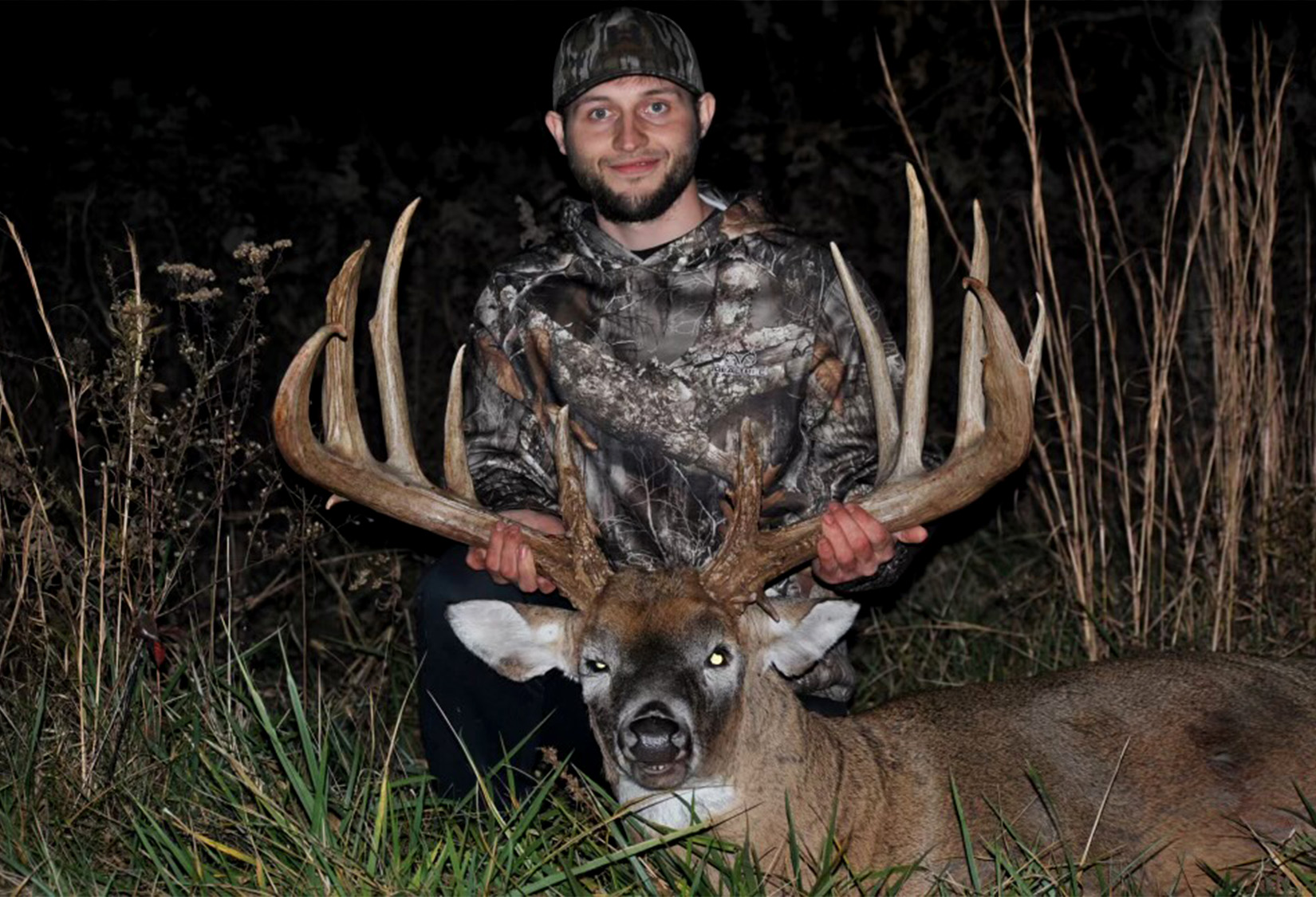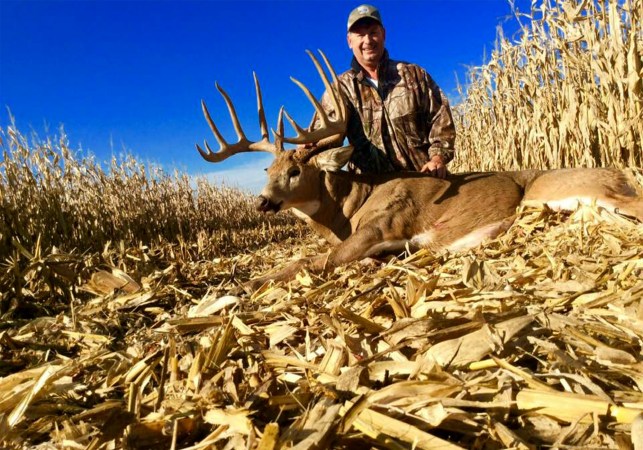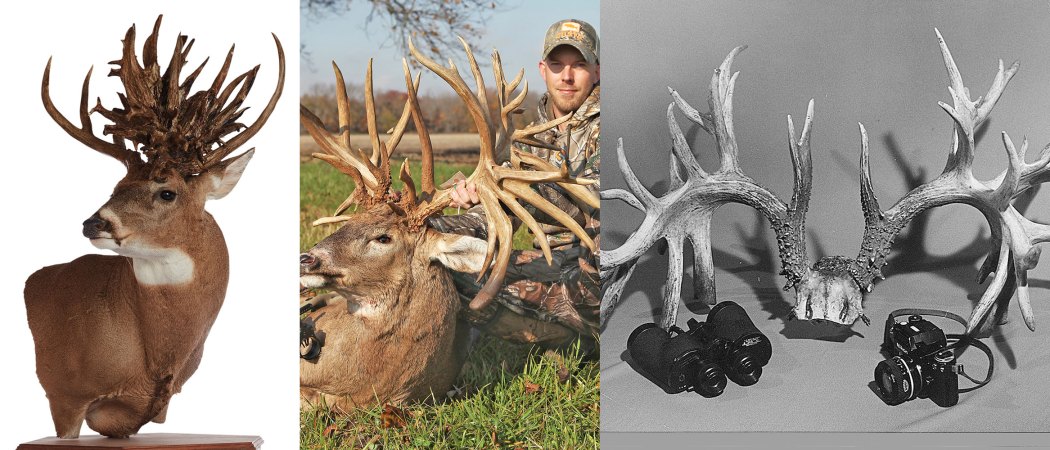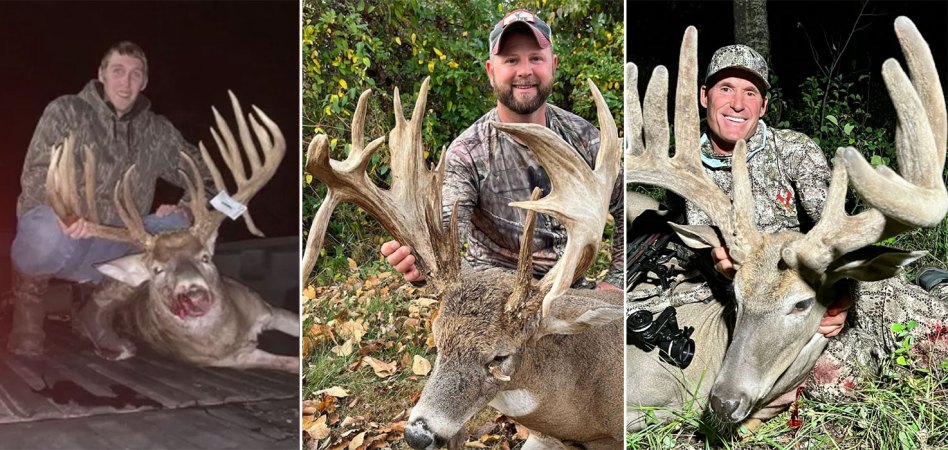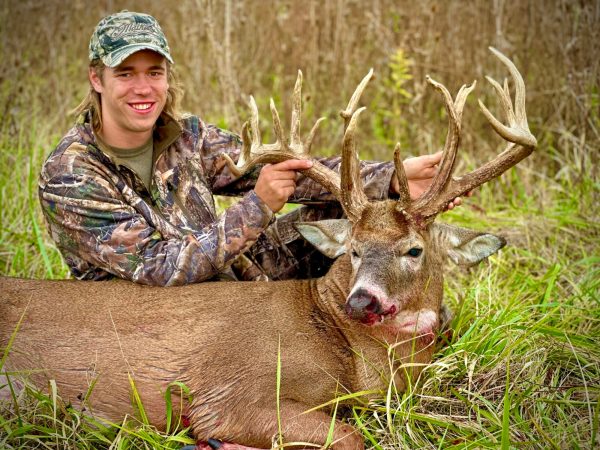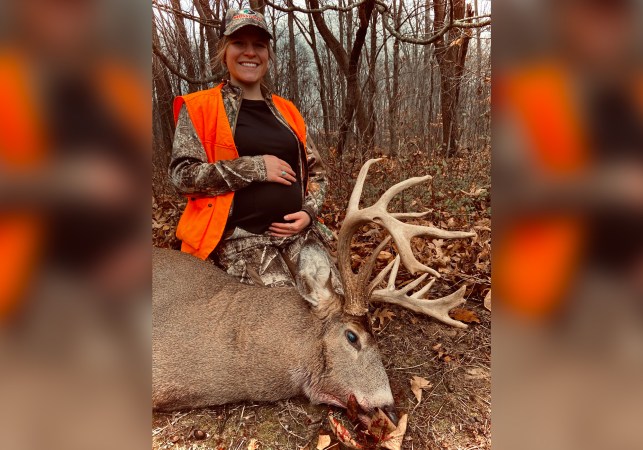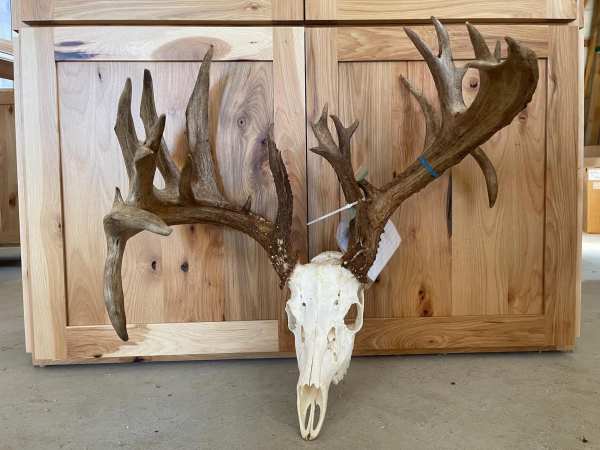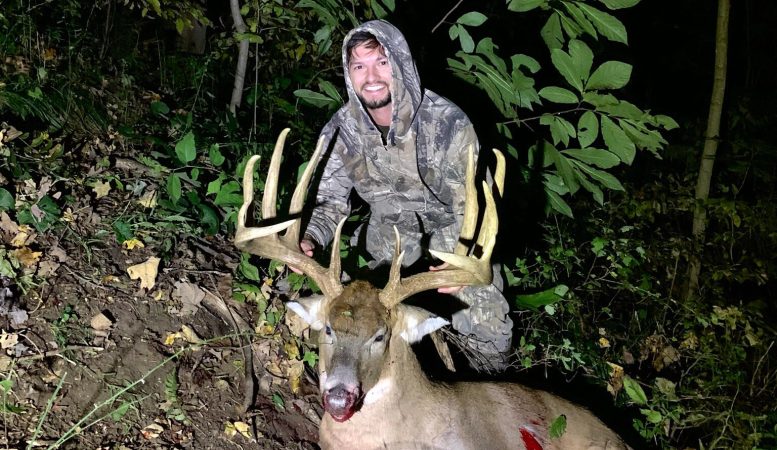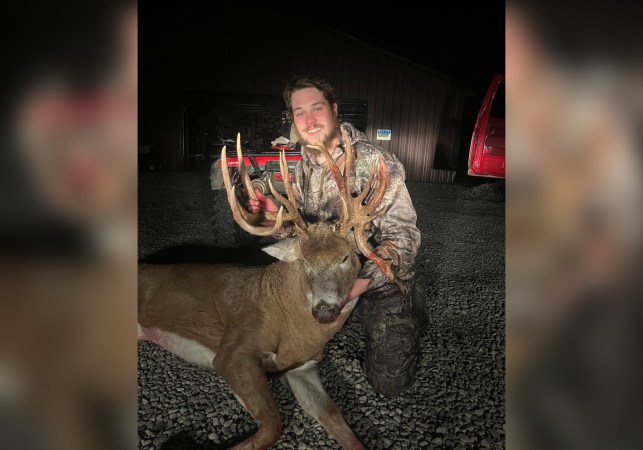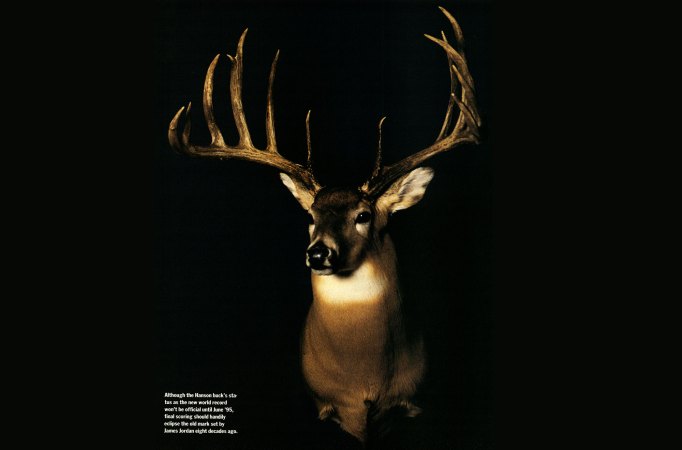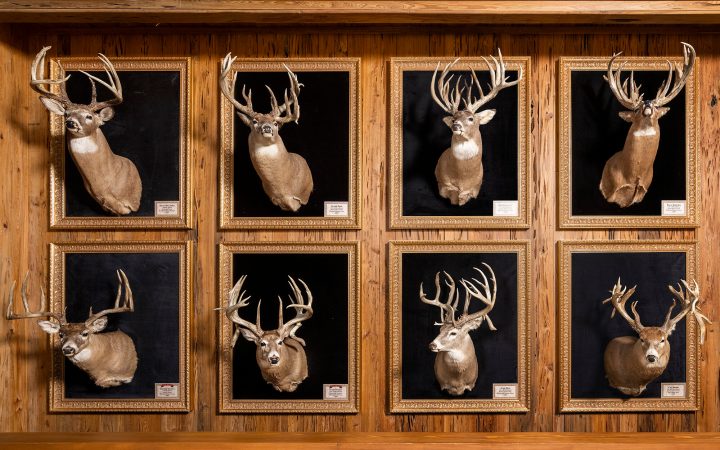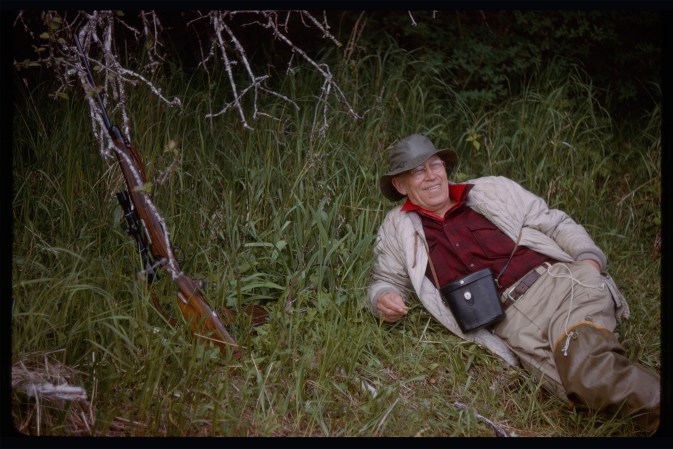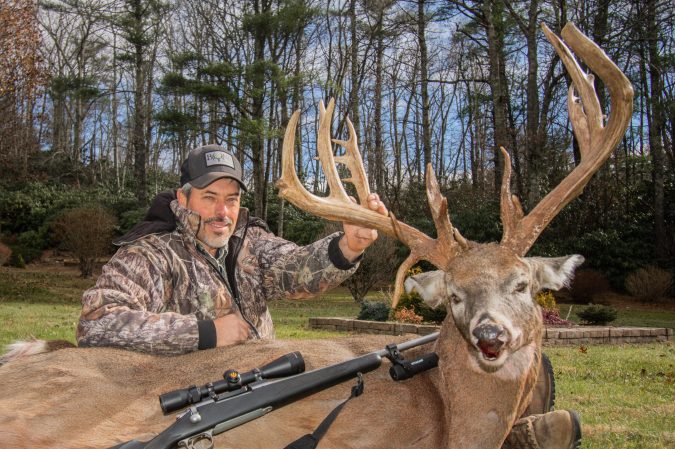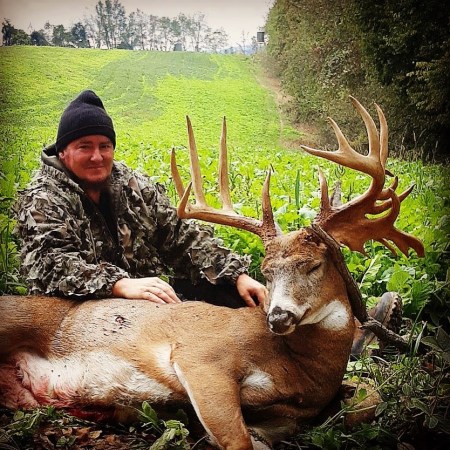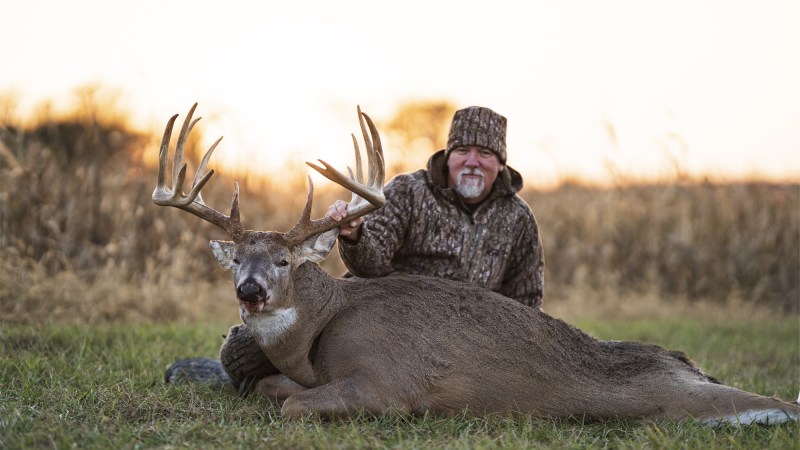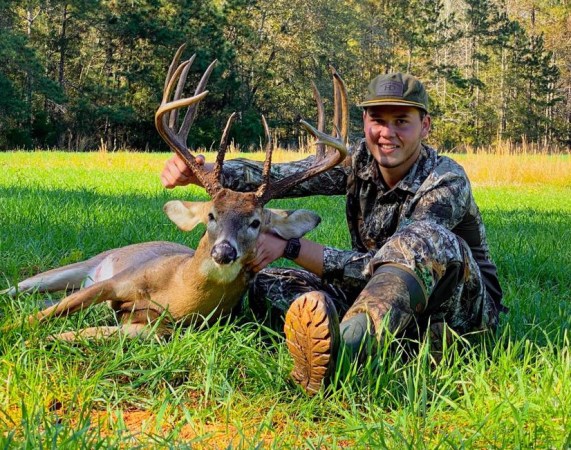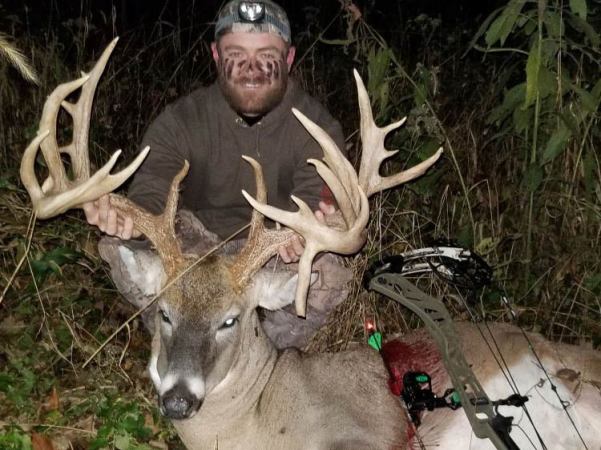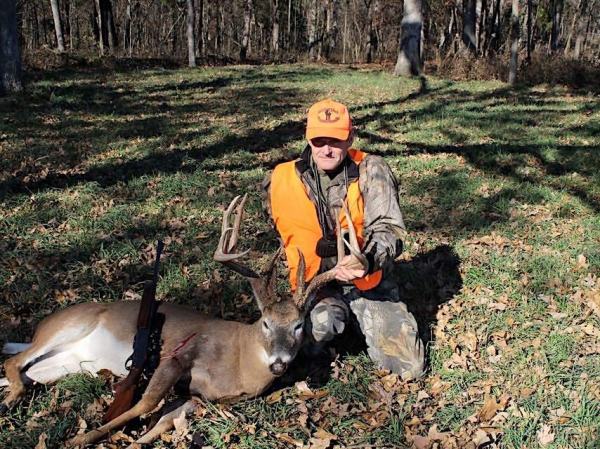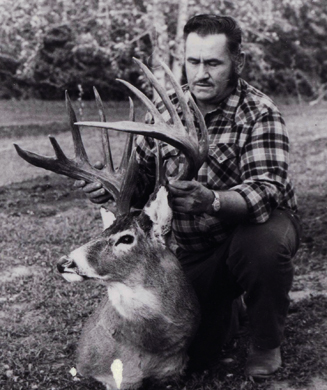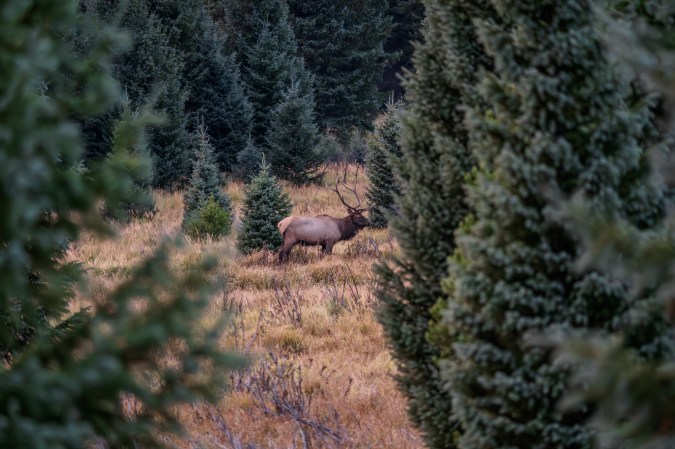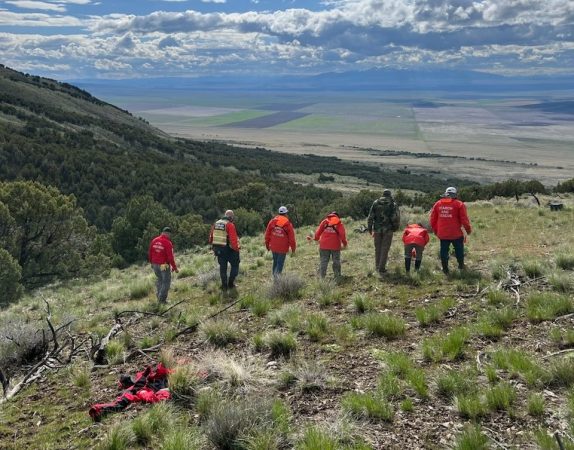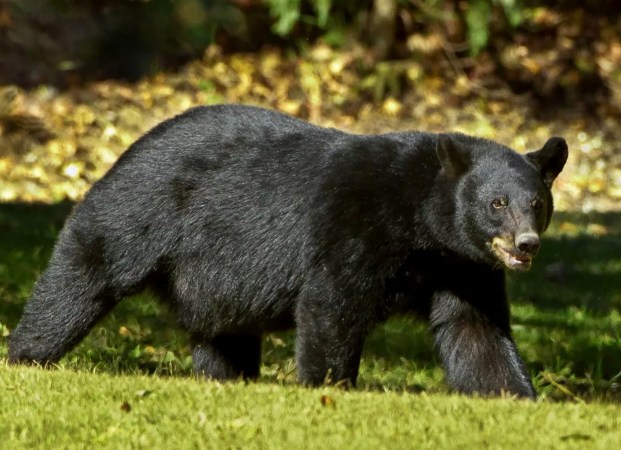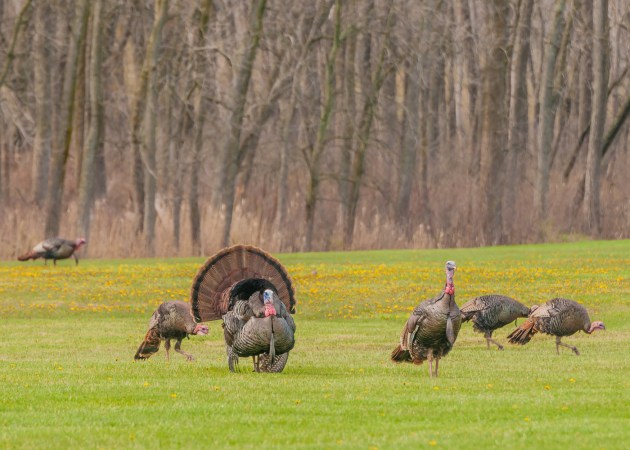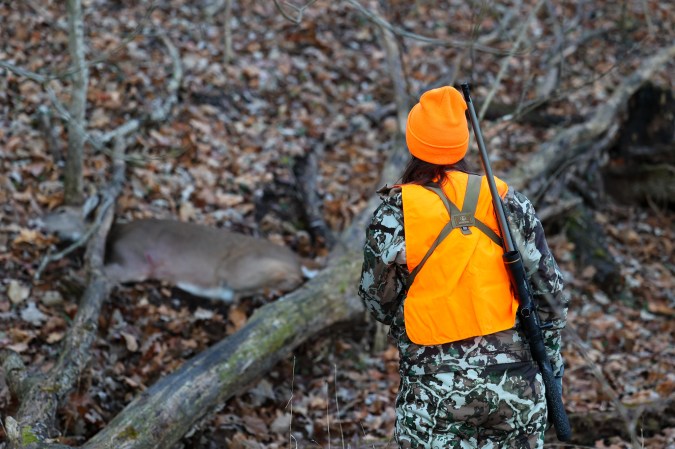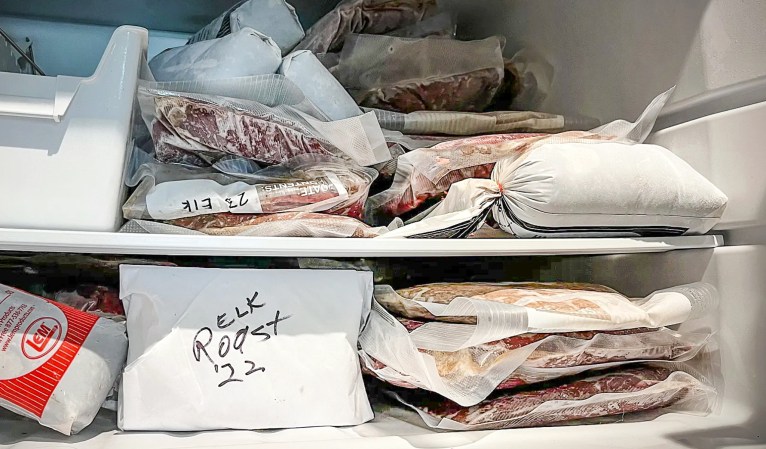UPDATE: The Ohio DNR confirmed with Outdoor Life on May 10 that CJ Alexander has been indicted on 23 criminal charges as a result of its poaching investigation. Read the full report here.
Dec. 26, 2023. Amid a recent firestorm of poaching allegations surrounding a deer known as the Alexander Buck — a potentially record-breaking whitetail killed by Christopher “CJ” Alexander — the Ohio Department of Natural Resources has confirmed that they confiscated the deer from Alexander’s possession and have launched an investigation.
According to a DNR Press Release obtained by Outdoor Life: Wildlife officers from the Ohio Department of Natural Resources (ODNR) Division of Wildlife are investigating a potential record deer taken during the archery hunting season in Clinton County, Ohio. The deer was reported to have allegedly been taken by Christopher J. Alexander, 28, of Wilmington, on Nov. 9, 2023.
An investigation was launched by the Ohio Department of Natural Resources after information was provided alleging that Alexander failed to obtain the lawfully required written permission prior to hunting on private property.
While the investigation continues, Ohio wildlife officers have seized the antlers, cape, and hunting equipment associated with the alleged unlawful taking of the deer.“
Dec. 8, 2023. Many hunters dream of notching our tag on a record-book buck—some 200-plus-inch Midwestern behemoth that roars instead of grunts and comes into our setup stiff legged and slow.
A lot of us refer to this kind of deer as a “Booner,” a nod to the Boone and Crockett Club, which is the widely-accepted national gold standard for antler scoring and big-game record keeping in North America. An entry into those hallowed pages is something most of us only ever fantasize about.
But what happens when that dream becomes a reality and you kill a deer that has a legitimate shot at becoming one of the top three whitetails of all time? And what happens when a controversial rule in the scoring system could mean the difference between record-book glory and an honorable mention?
Ohio hunter CJ Alexander is in the midst of figuring all that out. He recently sat down with Outdoor Life to talk about the potential record whitetail, his newfound fame, and the infamous scoring rule that might determine the buck’s final place in the record books.
A 12-Hour Sit
“This season was kind of messed up for me,” Alexander tells OL, explaining that family commitments left him little time to scout for deer. He’d also sold his compound bow last year to bring in some extra money. “I bought a crossbow I figured the whole family could use this year, and that [literally] blew up on me a couple days before I was planning to hunt.”
Luckily, his buddy Cory Haunert lent him his crossbow and a portable climbing stand. In the predawn hours of Nov. 9, Alexander shimmied up a tree overlooking a chunk of his sister’s 30-acre property where two woodlots meet near a few small ponds. He was committed to an all-day sit, and with a cold front rolling in, he was expecting some serious action. Instead, he saw just four or five deer all day.
“I forgot my phone and was bored as hell, honestly,” Alexander says. “I really thought I had wasted my time coming out there.”
During his 11th hour in the stand, Alexander was watching a doe idly browse when he was snapped to attention by a sound he’d never heard in the deer woods before. It sounded buckish but was hard to identify, and after 10 minutes passed, he heard it again.
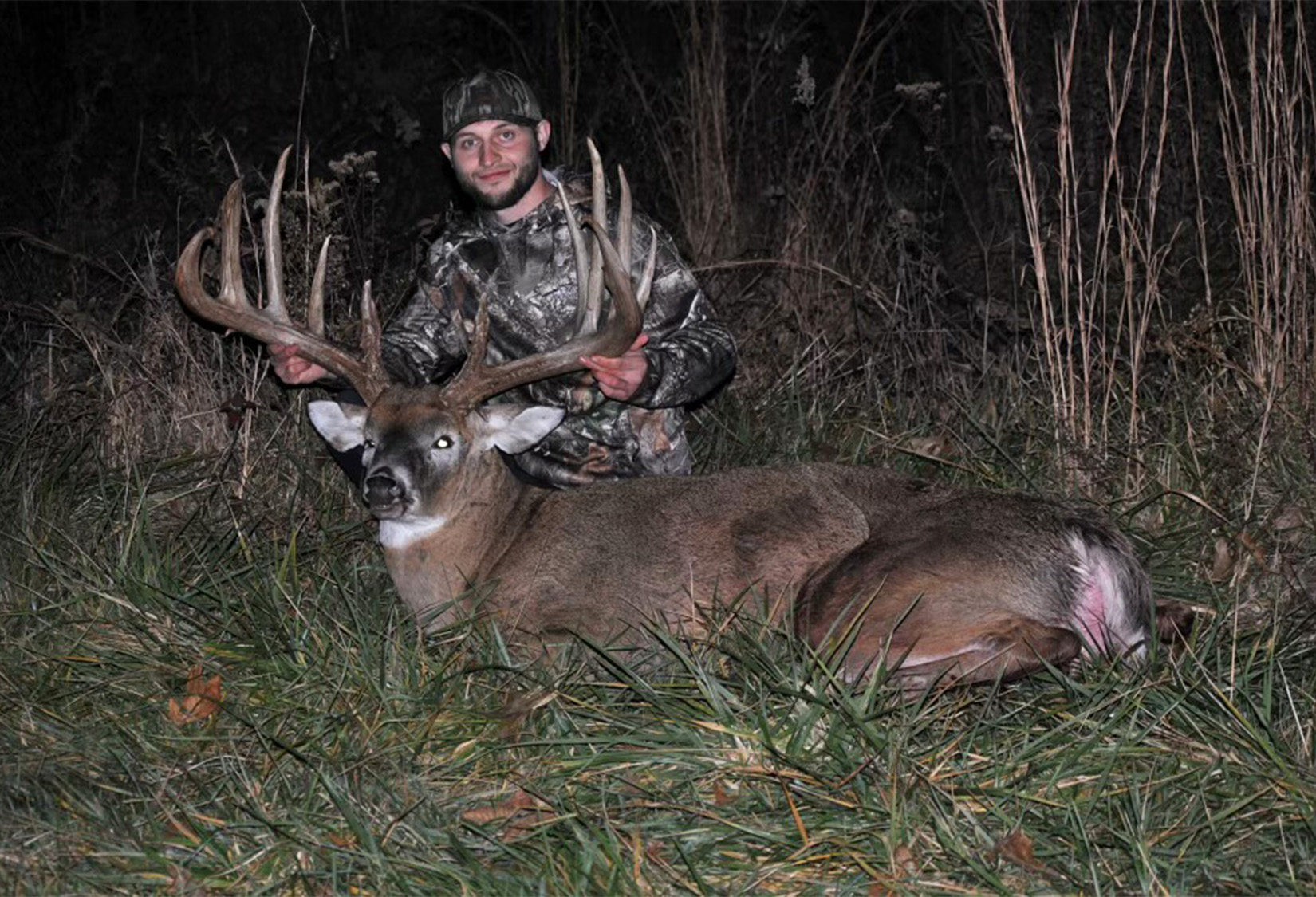
Photo by Sierra Smith
“Normally you kind of have to be listening to hear a buck grunt, but this was loud, like almost a roar,” he says. “This time I peek around the tree and at about 125 yards, I see this buck step out. Instantly, I’m floored and thinking, Holy shit. What is that thing?’”
It took a full hour for the buck to travel the 100 yards from where it stood to an open spot on the trail alongside Alexander’s stand. At just 7 yards, the buck cleared the brush and offered Alexander a perfect broadside shot. What followed was a nightmare.
“I made an absolutely god awful shot,” he says. “I don’t know if it was so close I was holding on the wrong spot, or if I just got buck fever or what. I have no clue.”
The buck ran toward the pond to where the doe had been, and for a while it just stood there with its back hunched and tail tucked. Alexander knew he needed to get another arrow in the deer, but as he reached down for the bag containing the cocking string, he realized his safety harness—buried under layers of clothing—was preventing him from reaching it.
“I was tied in, too. It wasn’t like I could unclip a carabiner real fast,” Alexander recalls. “It was holding me up too high and I just couldn’t reach down.”
He popped a boot in the stirrup of the crossbow and desperately tried to cock it with his bare hands, but was unable to draw the string far back enough to load a bolt. The buck began to move again, working back into the brush before reappearing on the trail. It walked past Alexander’s stand at just 12 yards. All he could do was watch.
“I figured the best thing I could do was keep an eye on him and plan out where I was going to start tracking him in the morning,” Alexander says.
Back at home Alexander, called Haunert, his buddy who loaned him the crossbow, and they decided to back out for the night.
“I FaceTimed Cory and told him I shot a deer, and then I just broke down crying. Cory was like ‘Hey man, what’s wrong?’ And I told him it was the biggest deer I’d ever seen and I’d hit him bad.”
The Smell of Success
The pair met at the property the next morning and began their search. Alexander was worried the buck had left the 30-acre parcel, which would further complicate things. (In Ohio, a landowner has no obligation to allow a hunter to recover game from private property.) But as they approached the spot where Alexander had last seen the deer, Haunert froze.
“Cory starts sniffing the air,” Alexander says. “Like audibly sniffing the air. And he goes, ‘Do you smell that? That smells like a ruttin’ buck. That smells like a musky deer.’”
As the two stood there, Haunert saw Alexander glance over his shoulder toward the ponds and do a double take. Haunert’s eyes followed Alexander’s gaze to where a white belly and mass of antlers lay beside one of the ponds. The pair ran over to the deer, high-stepping and splashing through the water.

Sierra Smith
“Cory just kept saying, ‘CJ, you have no idea what you just did. You have no idea.’ He acted like I’d shot Bigfoot.”
The aftermath of shooting a big deer is pretty universal. The deer gets loaded into the back of someone’s pickup, driven by the homes of friends and family, and eventually, the parade ends at the taxidermist. There’s a lot of picture taking, a lot of storytelling, and a lot of celebrating.
What there are not a lot of, normally, are five-figure cash offers.
Out Come the Offers
“I didn’t realize how big of a deal it was,” Alexander says of his buck. He knew it had some real value to him, but never considered the value it would have to a certain faction of whitetail fanatics: trophy antler buyers.
As news of Alexander’s deer began to spread, he started receiving messages from people wanting to purchase his buck. Alexander says most of these messages have included three things: a congratulations, a cash offer, and a seed of doubt about the buck’s ultimate score. He shared one of these exchanges with OL: “I think after it’s paneled, it won’t be a state record for B&C. Looks like it will net in the upper 170’s unfortunately … Keep me in mind if you ever entertain the idea of selling.”

Courtesy CJ Alexander
“Buyers will definitely play that game,” says Klaus Lebrecht, owner of world-renowned reproduction studio Antlers by Klaus. Lebrecht knows a thing or two about record whitetails and the antler market. If you’ve ever wandered into one of Bass Pro Shops’s “King of Bucks” displays, you’ve seen Lebrecht’s work. They trusted Lebrecht to remount the antlers of the Hanson buck, which is the number-one whitetail of all time. Lebrecht routinely handles some of the most well-known and highest-scoring whitetails of all-time, and he’s unsurprised by the cash offers Alexander’s buck has already drawn.
“They want the kid to sell quickly before it’s all sorted out what he’s really got,” Lebrecht says.
What he’s “really got” is the big question. Ohio’s Buckeye Big Buck Club secretary Mike Rex gave the buck a green score of 206 7 / 8 inches. If that score were to hold up to a B&C scoring panel, Alexander’s buck would become the No. 3 all-time typical whitetail ever taken in North America, and the No. 1 typical whitetail in Ohio.
“Right now the deer could easily bring $50,000,” Lebrecht says. “But if the thing gets certified by Boone and Crockett as being number one in Ohio and top three in the world, it puts it in a different category. Then it could be worth $80,000 or more.”
The Common Base Controversy
Regardless of his shot at a North American record and the thousands of dollars it would add to the value of his deer, Alexander doesn’t think he’ll submit the buck to B&C for scoring. He says he’s too worried the Club will score the antlers unfavorably, because of the record-book politics surrounding a feature called a “common base.”
A common base describes any two tines that emerge from the same base. In the B&C scoring system, depending on the configuration of the common base, these tines are either scored as typical points, or they’re counted as nontypical features. Since the Alexander buck would be scored as a typical deer, the measurements of any nontypical tines would then be deducted from its net typical score.
Read Next: The Case Against Scoring Big-Game Animals
Alexander acknowledges that the G-2 and G-3 tines on the left antler of his buck share a common base. He also realizes that in his bid for the state record, a nontypical common base and the resulting deductions would be devastating.
Assuming the buck’s net green score of 206 7/8 inches held through the 60-day drying period—which is unlikely because some amount of shrinkage is natural—its net typical score would fall to 191 4/8 inches after adjusting for the common base deductions. This would drop the deer from its potential spot as the new Ohio state record to No. 8. It would also remove the buck from contention in the Top 10 list of all-time North American whitetails—a far cry from its current would-be No. 3 position.
Alexander’s primary concern is that the Boone and Crockett Club won’t give his deer a fair shake on its merit alone. He points to the comparisons that have already been made between his buck and another giant Midwestern whitetail who’s final score was steeped in controversy.
“I don’t think they’ll rule it typical because then they have to explain why mine is [typical] and the King Buck isn’t,” Alexander says.
The King Buck
In 2012, six years after Johnny King shot his Wisconsin giant, a B&C scoring panel issued one of the single most controversial scorings in its long history. After accounting for a nontypical common base and the resulting deductions, the King buck dropped from 213 6/8 net typical—a score that would have made it the No. 1 all-time typical whitetail in North America—to 180 inches.
The score stunned the deer hunting world, and it introduced the phrase “common base” to whitetail hunters across the country. A shadow of that controversy remains, and it’s caused some to question the deer-to-deer objectivity of the Club’s scoring system. The way Lebrecht sees it, B&C didn’t didn’t think the King Buck had the qualities of a No. 1 whitetail, so they ruled it out on a technicality.
“They didn’t like the look of the Johnny King Buck because of the stunted G3,” Lebrecht says, “so they tightened the criteria up.”
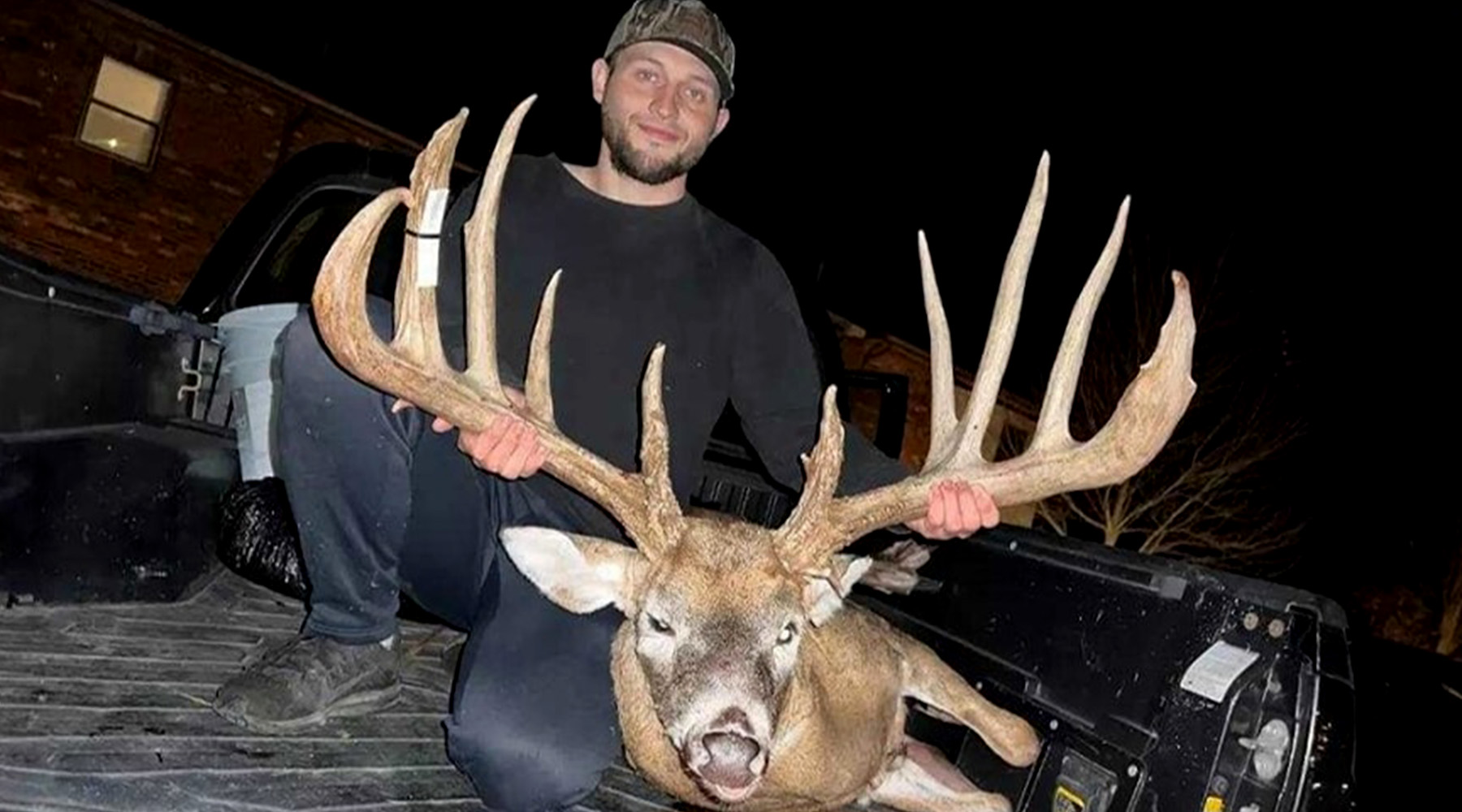
Courtesy CJ Alexander
In its initial response to the backlash that followed, the Boone and Crockett Club put out a statement regarding the King Buck’s final score. The Club clearly outlined the scoring process undergone by King’s deer, which they maintain was undertaken objectively and with the goal of documenting conservation success.
But there’s a line in that statement that defenders of the King Buck say holds particular significance: “The teams independently scored the buck using the Boone and Crockett scoring manual plus updated directives and processes outlined in other Club literature.”
Those “updated directives and processes” are what Lebrecht and others take so much issue with.
“The rules had changed between when the buck was publicized and when it was scored,” Lebrecht says. “I don’t think it was coincidental, absolutely not. I think that was very clearly done for the reason of discrediting that deer. They didn’t want it to be the world record.”
Despite his frustrations with the King Buck, Lebrecht isn’t all critical of the Boone and Crockett Club. In addition to what he calls the “labor of love” undertaken by the organization’s many volunteers (B&C scorers do not receive compensation for measuring and scoring animals), he believes they’re a valuable pillar in the conservation community.
“I don’t think we need to throw the baby out with the bathwater,” he says. “The Boone and Crockett Club has done tons of great conservation work. There are so many good things there that far outweigh the disappointments.”
By 2012 the King buck had mostly faded from the public eye. However, public court records show that the issue wasn’t legally resolved until five years later.
In October 2016, the King buck’s current owner, Jay Fish, sued the Boone and Crockett Club, asserting “state-law claims of breach of contract and strict responsibility misrepresentation.” On Oct. 5th, 2017, just four months after a federal judge denied the Club’s motion for dismissal, the court signed a stipulated dismissal with prejudice, which is an agreement between both parties that the case should be dismissed and never again litigated.
B&C declined to comment on the King Buck and Alexander’s buck since it hasn’t been entered for scoring.
Alexander says he’s planning to have the buck scored by the Buckeye Big Buck Club, which uses the B&C scoring system and has the ability to certify an Ohio state record. Unlike B&C, however, the Buckeye Big Buck Club doesn’t have to answer to the scoring of the King Buck, and Alexander believes this will lead to a more objective scoring of his deer.
“The Buckeye Big Buck Club uses Boone and Crockett Club standards,” Alexander says. “So you could basically do the math and find out where it would fall in the world, as far as typicals.”
Someone Who’s Been There
Few hunters can relate to the position that Alexander finds himself in. But that’s not to say no one can relate.
Dustin Huff killed his namesake buck in November 2021. The Huff Buck scored 211 4/8 inches net typical, and currently sits at No. 1 in the state of Indiana and No. 2 all-time in the Boone and Crockett book. Huff understands the pressure a buck like this can put on someone, particularly when it comes to making smart business decisions.
“People are coming at you from all different directions—what you should do, what you shouldn’t do, if you did it right, if you did it wrong,” Huff says. “It can be overwhelming.”
As for offers to buy the antlers, Huff got his share of those, too.
“I got a bunch of $20,000 offers,” Huff says. “Messages on Facebook like ‘Hey man, I’m an antler collector, here’s what they’re worth.’”
Most of the buyers, Huff believes, were just seeing if they could score a deal off someone who didn’t know what they had. But Huff knew what he had, and in his mind, there were only two offers he received that he felt were worth considering.

Sierra Smith
“One was for $50,000 and the other beat that offer by a pretty significant margin. I’m not going to say it was $200,000 more, but it was a much better offer,” says Huff, who sold his record buck in 2022 for an undisclosed amount.
When asked if he had any advice for Alexander, Huff thought for a second.
“You know, man, just have fun with it,” Huff says. “Go with your gut feeling on everything. You’re gonna have people in your ear, but just go with what your gut tells you.”
Alexander says he isn’t too worried about how the whole thing shakes out. He considers himself “beyond blessed” to even have seen a deer of that caliber, let alone notched his tag on one. He says he owes a lot to his buddy Haunert, who helped him throughout the hunt with borrowed gear, an extra hand, and moral support. And as of right now, Alexander has no plans to sell his potential record-book buck.
Read Next: The Record Whitetail That No One Heard About…Until Now
“I don’t plan on it unless someone offers me something insane, like well into six figures, and I don’t think that’s going to happen.”
That’s not to say he doesn’t have any plans for the deer. If it makes the record book as Ohio’s No. 1 all-time typical whitetail, Alexander says he hopes to exhibit the buck at Johnny Morris’s Wonders of Wildlife Museum and Aquarium in Springfield, Missouri.
“I think that would be a good place for everyone to enjoy it, and it would be with other world class deer,” Alexander says. “If that don’t happen, he’ll go to my son one day.”
